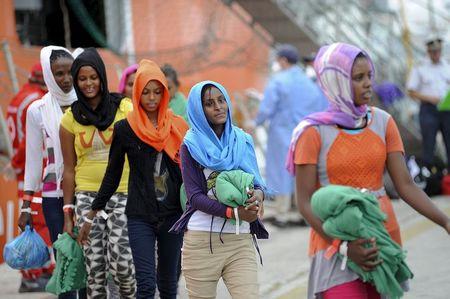Advertisement
EU to take in 40,000 migrants from Italy, Greece: draft communique
BRUSSELS (Reuters) - EU leaders will agree on Thursday to take in 40,000 asylum-seekers from Italy and Greece to confront a growing migrant crisis in the Mediterranean but delay a decision on how to share them out, according to a draft final summit statement.
Stung by the deaths this year of almost 2,000 migrants trying to reach Europe by boat, the European Union has promised an emergency response but not national quotas for housing people fleeing war and poverty in Africa and the Middle East.
Governments will agree to "...the relocation over two years from Italy and Greece to other member states of 40,000 persons in clear need of international protection, in which all member states will participate," according to a draft seen by Reuters.
EU countries will take part on a voluntary basis.
"We have no consensus on mandatory quotas for migrants, but ... that cannot be an excuse to do nothing," said Donald Tusk, the president of the European Council who chairs summits, as he arrived. "Solidarity without sacrifice is pure hypocrisy."
EU leaders tackled the issue over dinner at their summit in Brussels, with some eastern and central European countries, which are reluctant to take refugees, asking for guarantees that the system be temporary and voluntary.
The decision on the criteria to share migrants among member states will have to be made by the end of July, the summit draft communique said. They are likely to include such factors as the size of a member state's economy and population.
The criteria system would replace unpopular proposals that the EU Commission should impose mandatory quotas on each country.
The EU will also commit to resettle 20,000 refugees directly from countries such as Syria, Iraq or Afghanistan.
Divisions among EU governments have emerged over the wave of boat migrants crossing the Mediterranean, and strained the EU's commitment to its Schengen agreement on passport-free travel.
This week, Austria threatened to reimpose controls on its border with Hungary and Britain called for more security around the French port of Calais. Hungary has called the European Commission's relocation plan "absurd", while Spain wants a bigger focus on returning migrants to their countries of origin.
But many governments agree the system for tackling migration is broken, with a huge burden on countries such as Italy and impoverished Greece.
The EU leaders agreed to strengthen mechanisms to repatriate migrants who cannot claim asylum in Europe.
"We need treaties for readmitting people so that traffickers are clear that those they send illegally will be returned home," Spanish Prime Minister Mariano Rajoy told reporters.
(Reporting by Robin Emmott; editing by Andrew Roche)



















Add new comment